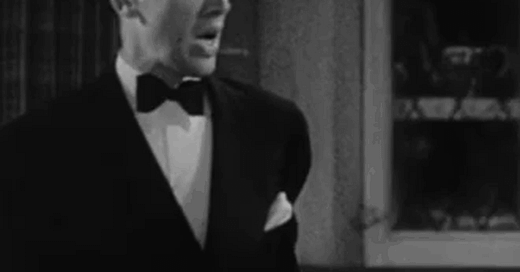GROSS/28-1 1938 - Frank Capra and capitalism
I don't want to be a stuck record but this guy really isn't the man you think he is.
Gross is every year’s top-grossing movie, since 1913, reviewed.
YOU CAN’T TAKE IT WITH YOU, FRANK CAPRA, COLUMBIA PICTURES, 1938, 126 MINUTES. JAMES STEWART, JEAN ARTHUR, LIONEL BARRYMORE
In the last post I asked subscribers to choose the next film for me to watch because I had two 1938 candidates. Most of you said I ought to watch both. This I don’t mind. I’ve started with the Frank Capra. Robin Hood next!
What shape would the modern world have taken if, instead of Hays Code Hollywood, it had been Popular Front France that had dominated world film culture since the 1930s? A ridiculous question, of course, knowing what we do about the rise of the American economy since then, about the confidence and resources of the studio system.
But humour me. What if it had been Jean Renoir and not Frank Capra who'd set the ideological baseline for narrative film, for storytelling in the 20th Century, for the first global art-form?
Would things have been very different without the decades of subtle and persuasive propaganda for the market, for self-reliance, for the consolations of family, the genius of the entrepreneur and the centrality of the individual that Hollywood has been seeding our cultures and our economies with for all these decades?
Capra was sometimes, back in the thirties, identified with the Europeans. He was even suspected of being a Communist once or twice. It's not hard to understand. His populist stories - restive crowds, cross-country buses, packed courtrooms, wicked bankers, families and communities, spunky individuals and troubled heroes - look like popular fables. In this film, when the plutocrat and his grand wife wind up in the drunk tank with prostitutes and thieves it’s purest Capra - a fairytale setting for a parable about hubris and the wisdom of ordinary people.
And these American stories often have a superficial resemblance to the European ones, to the tales of workers and soldiers and farmers and fallen nobles - archetypes and models for action. It's easy to confuse the ecstatic ending of a Capra movie - a revelation, a reunion, joy in recognition - with those of the European directors of the period, whose endings are often ecstatic but usually also grand and tragic and terribly compromised.
Capra's down-home heroes take on capital but never overcome it - they don’t even want to. Lovers defeat cynicism and greed but always stop short of replacing them with something decent. Solidarity is local and temporary. Lessons are learnt but only right here and right now. At the end of this film, the millionaire banker is not beaten but taught an important lesson. At the end of It’s a Wonderful Life, our hero is still in trouble, still ruined, just a bit more cheerful about it.
In these movies the superstructure persists, authority may be momentarily humbled but carries on regardless. And this, of course, becomes the template for practically every Hollywood movie since then - from Casablanca to Spiderman to The Godfather. Every story plays out entirely within the framework (see also the end of the chaotic first period of animated movies in last week’s post).
Even fantasy movies - superheroes and elves and aliens - take place entirely inside the ethical universe of capital. Galaxies may shatter and disperse but the final act will always reassert the logic of ownership, authority, the sovereign individual.
I love the movies - I love Hollywood - but honestly I don’t like to think too much about the painfully diminished reality we’ve accepted, about the reversal of all of cinema’s liberatory promise that came about as capital closed off the exits in the decades after the silent era.
About the possibility that cinema as an art-form might once have had the potential to free us, to expand our horizons, to dismantle exploitation and alienation - but ultimately did something much less ambitious and much more cynical. Capra, j’accuse.
To be clear, this is a terrific film. It has a really joyful, chaotic Ealing Comedies vibe, ten years before the first one of those. And the ensemble could really have been lifted from a Renoir or a Vigo. Variagated, funny, human. We love them all. I personally find Capra alternately nauseating and elevating. I always cry, though.
You Can’t Take it With You is on Amazon Prime and on DVD. Renoir’s La Grande Illusion, from a year earlier, is also on Amazon but for some reason doesn’t have English subtitles, so get your phrase book (the version on Apple TV+ does have subtitles).
Capra’s actual politics was a grim mix of nativism, populism and cowardice. During his career he informed on his peers, lied about his achievements, stole from his friends. It’s not pretty. There’s more about the man and his politics in my post about It Happened One Night, his first big hit.
Renoir became a Hollywood filmmaker during the second world war and was even nominated for an Oscar. La Grande Illusion also puts an ensemble in a tight corner and also teaches those in charge a thing or two but, as you’d expect, we’re on another level - morally, politically, historically. For Capra’s 12 blocks of real estate substitute a continent at war.
In the prison scene we meet entertaining drunks, criminals and sex workers. Not Hays Code-compliant, surely? I imagine the loophole here is that these offenders are in a jail cell and can thus be shown to have had their comeuppance.
Here's a list of all the top-grossing films since 1913 and here's my Letterboxd list and here’s another top-grossing list.





